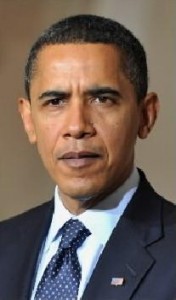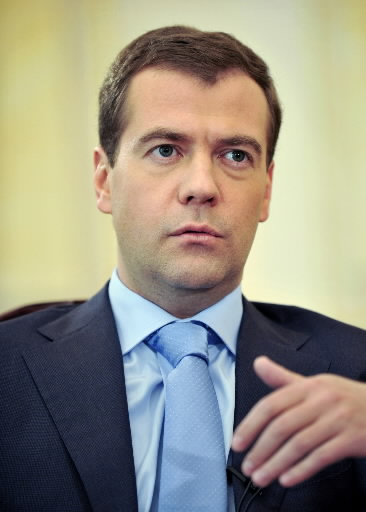Obama, Medvedev agree on outline for new nuclear arms pact
Jul. 7, 2009
by Takehiko Kajita
U.S. President Barack Obama and Russian President Dmitry Medvedev on Monday fixed a framework for a new pact that would reduce their vast arsenals of Cold War nuclear warheads to as few as 1,500 each as they tried to open up new prospects for often-thorny bilateral relations.
The framework accord, signed by the two leaders after talks at the Kremlin, marks the first major step toward completing by the end of the year negotiations on a successor to the 1991 Strategic Arms Reduction Treaty, or START 1, which runs out Dec. 5.
''We resolved to reset U.S.-Russian relations so that we can cooperate more effectively in areas of common interest,'' Obama said at a joint news conference with Medvedev. ''Today, after less than six months of collaboration, we have done exactly that.''
His host sounded a similarly positive tone.
''We'll have a full-fledged discussion of our relations between our two countries, closing some of the pages of the past and opening some of the pages of the future,'' Medvedev said through an interpreter.
Obama, who is calling for a nuclear-free world, and Medvedev set a goal of negotiating new limits of between 1,500 and 1,675 deployed nuclear warheads within seven years of a post-START 1 agreement coming into force, compared with the current ceiling of 1,700 to 2,200.
In addition to warheads, they also said the two nations will work out new limits on delivery systems -- the rockets or other means that deliver weapons. The new limit for such vehicles will be between 500 and 1,100, against the present limit of 1,600.
Furthermore, Obama secured Russia's nod to ship lethal military supplies to U.S. troops in Afghanistan across Russian territory -- an urgent priority as existing supply lines across Pakistan become less safe.
''It's our common, joint responsibility, and we should do our utmost to prevent any negative trends there, and we are ready to do that,'' Medvedev told the press conference. ''Our negotiations with President Obama have demonstrated that we share the same attitude toward this problem.''
Monday's summit follows the two leaders' first encounter in London in April, when they agreed to launch negotiations on a post-START 1 deal. Several rounds of talks have since been held.
It was intended to reshape ties between the United States and Russia, which plunged to their lowest point last summer since the end of the Cold War over a conflict in the former Soviet republic of Georgia, a U.S. ally.
Concerning deployed nuclear warheads, the 2002 Strategic Offensive Reductions Treaty commits both sides to paring down their stockpiles to between 1,700 and 2,200.
START 1, which resulted in significant reductions in the two nations' nuclear arsenals, limits the number of deployed warheads on both sides to 6,000 and the number of delivery systems to 1,600.
The agreements in nuclear and several other fields came despite differences between Washington and Moscow, including the U.S. pursuit of a missile defense system in Europe and its support of North Atlantic Treaty Organization expansion.
The two sides are far apart on U.S. plans to station an antimissile system in Poland and the Czech Republic -- which Moscow says would threaten its security. Washington insists the plans are aimed solely at averting a potential attack from Iran and North Korea.
But Obama and Medvedev agreed to continue to work together to assess global threats from ballistic missiles, with the Kremlin chief saying, ''Nobody is saying that ballistic missile defense is harmful or is posing a danger.''
While Medvedev insisted that a successor to START 1 must be linked to Russian concerns about the U.S. missile defense program in Europe, it is unclear whether Moscow is prepared to torpedo the negotiations over that issue.
Russia is also opposed to NATO's expansion eastward and indignant that the United States has left the door open to membership for Georgia and Ukraine, another former Soviet republic.
Reasserting the long-held U.S. position about Georgia, Obama said the country's sovereignty and territorial integrity ''must be respected.''
Other agreements between Obama and Medvedev include the resumption of U.S.-Russia military cooperation, the creation of a new joint government commission to manage bilateral relations, and an exchange of information on prisoners of war, according to texts released by officials.
On Tuesday in Moscow, Obama will meet with Russian Prime Minister Vladimir Putin, who many see as the power behind the throne in Russia, as well as with former Soviet President Mikhail Gorbachev.
Russia is Obama's first stop on a weeklong trek that will also take him to Italy and Ghana.
In Italy, he will attend the annual Group of Eight summit. The leaders of the G-8 -- Britain, Canada, France, Germany, Italy, Japan, Russia and the United States -- will also hold expanded talks with their counterparts from other major nations to discuss African development and climate change.
Ghana will be the first African country Obama has traveled to since taking office in January. His plans in the West African country include a speech and a visit to a castle that once served as a hub for slave trade.
(Distributed by Kyodo News on July 7, 2009)
U.S. President Barack Obama and Russian President Dmitry Medvedev on Monday fixed a framework for a new pact that would reduce their vast arsenals of Cold War nuclear warheads to as few as 1,500 each as they tried to open up new prospects for often-thorny bilateral relations.
The framework accord, signed by the two leaders after talks at the Kremlin, marks the first major step toward completing by the end of the year negotiations on a successor to the 1991 Strategic Arms Reduction Treaty, or START 1, which runs out Dec. 5.
''We resolved to reset U.S.-Russian relations so that we can cooperate more effectively in areas of common interest,'' Obama said at a joint news conference with Medvedev. ''Today, after less than six months of collaboration, we have done exactly that.''
His host sounded a similarly positive tone.
''We'll have a full-fledged discussion of our relations between our two countries, closing some of the pages of the past and opening some of the pages of the future,'' Medvedev said through an interpreter.
Obama, who is calling for a nuclear-free world, and Medvedev set a goal of negotiating new limits of between 1,500 and 1,675 deployed nuclear warheads within seven years of a post-START 1 agreement coming into force, compared with the current ceiling of 1,700 to 2,200.
In addition to warheads, they also said the two nations will work out new limits on delivery systems -- the rockets or other means that deliver weapons. The new limit for such vehicles will be between 500 and 1,100, against the present limit of 1,600.
Furthermore, Obama secured Russia's nod to ship lethal military supplies to U.S. troops in Afghanistan across Russian territory -- an urgent priority as existing supply lines across Pakistan become less safe.
''It's our common, joint responsibility, and we should do our utmost to prevent any negative trends there, and we are ready to do that,'' Medvedev told the press conference. ''Our negotiations with President Obama have demonstrated that we share the same attitude toward this problem.''
Monday's summit follows the two leaders' first encounter in London in April, when they agreed to launch negotiations on a post-START 1 deal. Several rounds of talks have since been held.
It was intended to reshape ties between the United States and Russia, which plunged to their lowest point last summer since the end of the Cold War over a conflict in the former Soviet republic of Georgia, a U.S. ally.
Concerning deployed nuclear warheads, the 2002 Strategic Offensive Reductions Treaty commits both sides to paring down their stockpiles to between 1,700 and 2,200.
START 1, which resulted in significant reductions in the two nations' nuclear arsenals, limits the number of deployed warheads on both sides to 6,000 and the number of delivery systems to 1,600.
The agreements in nuclear and several other fields came despite differences between Washington and Moscow, including the U.S. pursuit of a missile defense system in Europe and its support of North Atlantic Treaty Organization expansion.
The two sides are far apart on U.S. plans to station an antimissile system in Poland and the Czech Republic -- which Moscow says would threaten its security. Washington insists the plans are aimed solely at averting a potential attack from Iran and North Korea.
But Obama and Medvedev agreed to continue to work together to assess global threats from ballistic missiles, with the Kremlin chief saying, ''Nobody is saying that ballistic missile defense is harmful or is posing a danger.''
While Medvedev insisted that a successor to START 1 must be linked to Russian concerns about the U.S. missile defense program in Europe, it is unclear whether Moscow is prepared to torpedo the negotiations over that issue.
Russia is also opposed to NATO's expansion eastward and indignant that the United States has left the door open to membership for Georgia and Ukraine, another former Soviet republic.
Reasserting the long-held U.S. position about Georgia, Obama said the country's sovereignty and territorial integrity ''must be respected.''
Other agreements between Obama and Medvedev include the resumption of U.S.-Russia military cooperation, the creation of a new joint government commission to manage bilateral relations, and an exchange of information on prisoners of war, according to texts released by officials.
On Tuesday in Moscow, Obama will meet with Russian Prime Minister Vladimir Putin, who many see as the power behind the throne in Russia, as well as with former Soviet President Mikhail Gorbachev.
Russia is Obama's first stop on a weeklong trek that will also take him to Italy and Ghana.
In Italy, he will attend the annual Group of Eight summit. The leaders of the G-8 -- Britain, Canada, France, Germany, Italy, Japan, Russia and the United States -- will also hold expanded talks with their counterparts from other major nations to discuss African development and climate change.
Ghana will be the first African country Obama has traveled to since taking office in January. His plans in the West African country include a speech and a visit to a castle that once served as a hub for slave trade.
(Distributed by Kyodo News on July 7, 2009)









